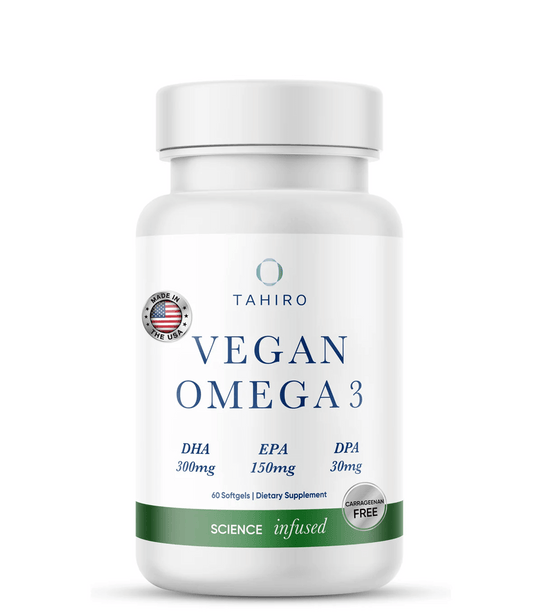Many people have heard of omega-3s. These compounds can be found in a variety of foods (especially fish), and are also very popular as supplements. They’ve been shown to be beneficial in a huge number of ways, especially for the brain, immune system, and blood vessels.
If you’re considering taking an omega-3 supplement, there are a few things you need to know about this group of essential fatty acids. Not all omega-3s are the same, and it’s essential to ensure that you select the right supplement to get the full benefits that omega-3s can offer.
What is Omega-3?
Scientific evidence suggests that chronic stress and oxidative stress may contribute to the development of neurodegenerative diseases, such as Alzheimer's and Parkinson's disease. Studies have shown that reducing stress levels can help decrease oxidative stress and inflammation in the body, potentially reducing the risk of these diseases. However, the relationship between stress, oxidative stress, and neurodegeneration is complex and not yet fully understood, and more research is needed to confirm the potential benefits of stress reduction in the prevention and treatment of these diseases.°
What is Omega-3 Made of?
There is not just one single fatty acid known as omega-3. Instead, this is a group of compounds, containing several different types of omega-3s. Different omega-3s are known to have different effects in the body.The primary type of omega-3 found in most plant-based sources is alpha linolenic acid (ALA), which is a short-chain omega-3. Seafood and other animal sources generally contain higher levels of the long-chain omega-3s, including eicosapentaenoic acid (EPA), docosahexaenoic acid (DHA), and docosapentaenoic acid (DPA).These compounds are found in fish oil, and also in specific plant-based sources. In order to get the benefits of EPA, DHA, and DPA, you need to ensure that you’re consuming these specific omega-3s. The levels of long-chain omega-3s can vary significantly in different supplements, even fish oil supplements. You can’t assume that your supplement contains enough of all three of these compounds to provide you with all of the benefits that you’re looking for.
Omega-3 Functions & Benefits
Every cell in the body is surrounded by a cell membrane, which is made up of fatty acids. When you consume omega-3s, these end up becoming incorporated into the cell membranes of cells throughout the body. Omega-3s help to maintain the fluidity of cell membranes. In addition, omega-3s serve as signaling molecules, and the body also uses them to make certain hormones. In these ways, omega-3s help to support healthy communication between cells.
Benefits
Through all of these mechanisms, omega-3s exert their beneficial effects in the body. Research has shown that omega-3s may:
Omega-3 Composition & Food Sources
You can choose to get omega-3s from supplements or from foods. Keep in mind that there are several different types of omega-3s, and different foods will contain a different mix of specific compounds.
In general, most plant sources of omega-3s contain mainly ALA. Good sources of ALA include flaxseeds, chia seeds, walnuts, tofu and other soy products.
Some ALA is converted to other omega-3s, like DHA and EPA, in the body. However, research has revealed that this conversion is not very efficient, and very little DHA and EPA are produced in this way. If you want to get enough of these long-chain omega-3s, then the best option is to ingest them, rather than relying on your body’s conversion of ALA to produce them.
Long-chain omega-3s are primarily found in fish and other seafood. The American Heart Association recommends[1] that all adults eat fish at least twice a week, to ensure that they’re getting enough long-chain omega-3s. Oily fish, like salmon, tuna, trout, herring, and sardines, are the best sources of these.

Is Omega-3 Good to Take Daily?
If you choose to take omega-3s, it’s generally recommended that you take them daily. As with any supplement, it’s up to you to decide whether you believe the potential benefits are worth the risks. It’s best to consult with your doctor as you make this decision, particularly if you have any chronic medical conditions or are taking any medications.
Traditionally, the advice has been to be careful about combining omega-3s with any type of blood thinners – even over-the-counter medications that cause blood thinning, like ibuprofen. The worry was that omega-3s reduce the risk of blood clots, so combining them with other medications that also do this might increase the risk of excessive bleeding.
While this is a reasonable concern, there’s now an abundance of scientific evidence demonstrating that omega-3s do not actually increase[2] bleeding risk. Although it’s always best to talk with your doctor before starting any new supplement, there’s also no evidence that taking omega-3s will increase your risk of bleeding.
Does vegan omega-3 have as many benefits as fish oil?
If you’re looking to get the full benefits of an omega-3 supplement, then you’ll want to make sure that you’re choosing one with balanced levels of EPA, DHA, and DPA. Because each of these compounds has been shown to have its own benefits, you need all of them to ensure that you’re not missing out on any of the benefits of omega-3s. In most cases, the levels of all of these long-chain omega-3s are very low in plant-based supplements. Fish oil usually contains EPA and DHA, although the levels are variable, and the levels of DPA in fish oil are generally low.
There are also plant-based sources of all three of these fatty acids. The advantage of using plant sources is that it avoids the potential mercury toxicity of fatty fish, and is also suitable for people following a plant-based diet.







